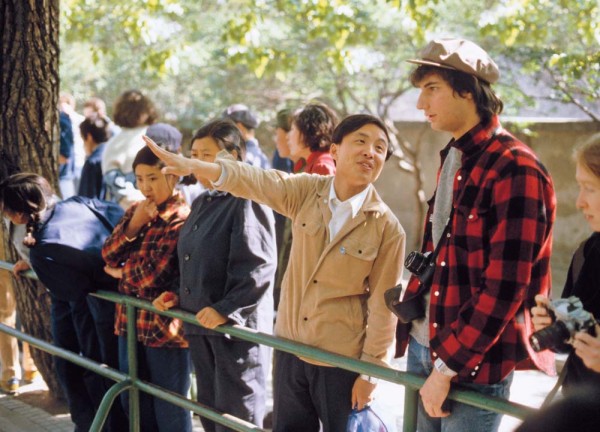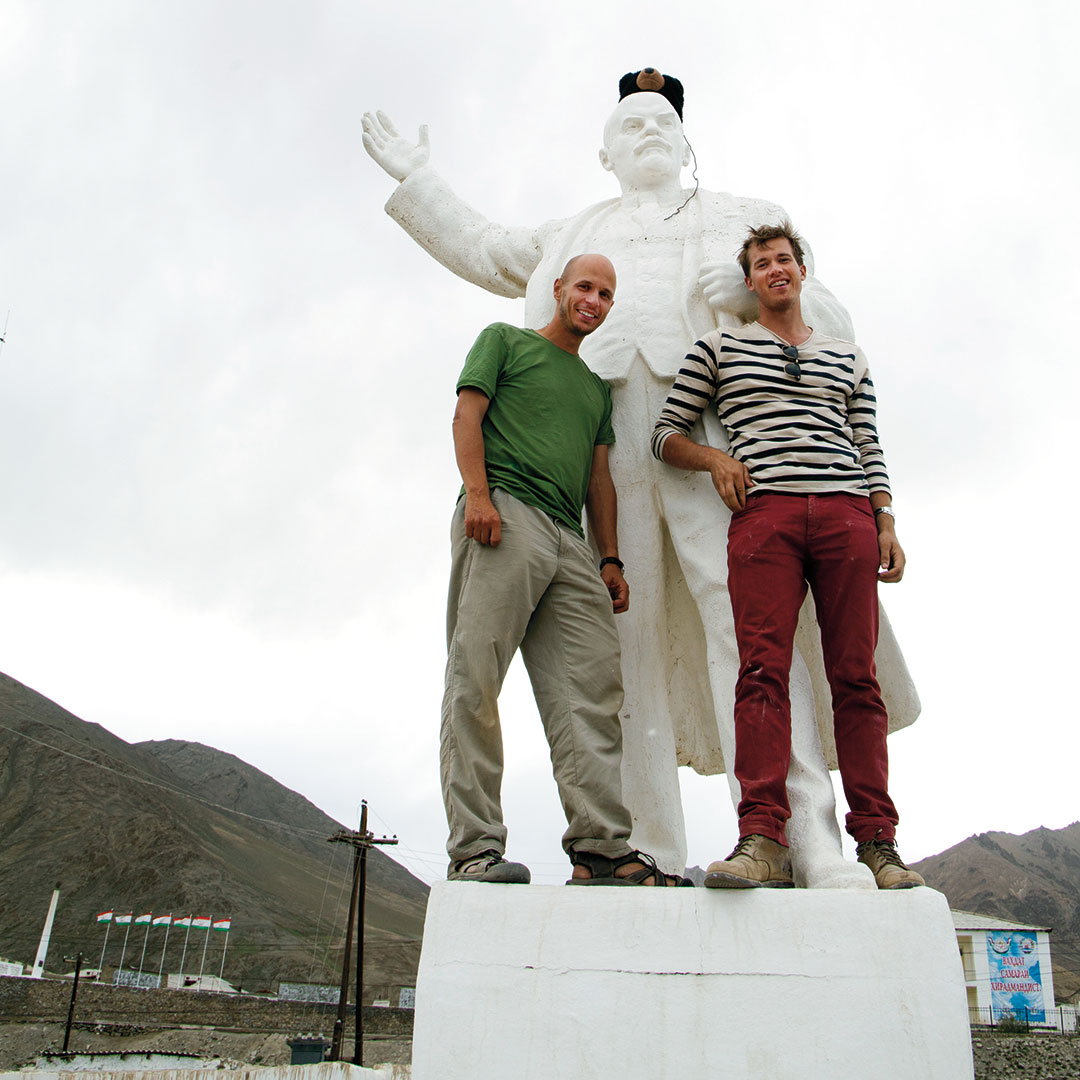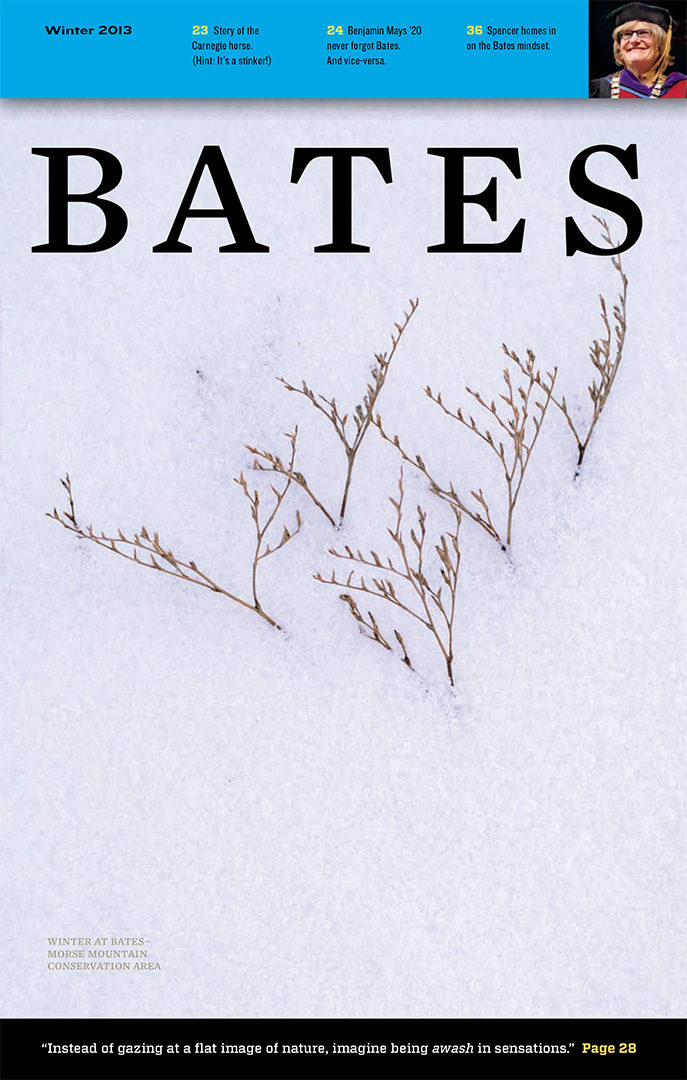
China’s economy, and a group of Bates students, were awakening in 1981
Like the vivid hues of spring’s first flowers, the flashes of color in these images of China three decades ago signal big changes to come.
In spring 1981, Professor of Sociology George Fetter took 27 students to China to observe a country in transition. Looking at these photos, taken by trip participant Steve Stone ’83, you can see how reforms under Deng Xiaoping were steering the country toward world economic power.
You see, for example, billboards offering consumer products, like electronics and clothing, for the first time.
Stone kept his Ektachrome slides safe through the years, digitizing them recently and sharing them with Bates Magazine as the trip’s 30th anniversary got him thinking about the experience.
Another student on that landmark Short Term was Paul Marks ’83, and he was back on campus last fall for the dedication of Hedge and Roger Williams halls as new academic centers.
Marks is now CEO of the global aerospace technology firm Argosy International Inc., based in Shanghai. He’s done business in China since 1988, and at the dedication he spoke about that transformational trip with Professor Fetter.
Back in ’81, most Chinese citizens still had good reason to blend in with the crowd — politically, socially and even sartorially, by wearing bland clothing. The nation was wary after Mao’s brutal Cultural Revolution, which had ended in 1976.
The lingering feeling was that “you didn’t want to be identified as the next possible target if the political winds changed again,” says Margaret Maurer-Fazio, the college’s Stangle Professor of Applied Economics and an expert on China.
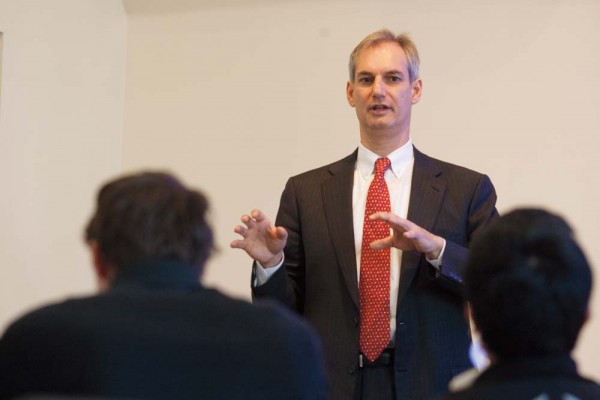
Paul Marks, here talking with students during a Bates Career Development Center lunch during his visit in October 2011, has done business in China since 1988. (Phyllis Graber Jensen/Bates College)
If the winds shifted one way, “you wouldn’t want to be accused of being a bourgeois capitalist ‘roader,’” she says. If the wind shifted the other way, “you wouldn’t want to be accused of clinging to feudal Chinese culture.”
So the adults in these photos are wearing mostly unremarkable, drab clothing.
But look at the young children in a traditional classroom: They’re wearing bright orange, blue and rose-color sweaters. A little boy and girl watching a Bates student blow bubbles wear bold red and blue coats.
Like the billboards, it’s a sign of what’s to come.
“In traditional Chinese society, many people would consider themselves lucky to get one new set of clothing each year, on the Chinese New Year,” says Maurer-Fazio, who studies the dramatic impact that economic liberalization has had on China’s labor markets. “And in Mao’s day, the economy was focused on heavy industry, and consumer goods were in short supply.”
In the newly colorful clothing of these children, she says, “you see today’s modern, consumer society.”
“I watched peasants hoe fields adjacent to the runways. The only peasants nearby today are landscapers for the villas by the airport.”
Thirty-one years ago, when Fetter and his students landed at the Beijing Capital Airport to begin their Short Term, the airport wasn’t today’s glorious, gargantuan Norman Foster–designed facility. It was a simpler airport “and a simpler China,” Marks recalled during his address last fall.
“I watched peasants hoe fields adjacent to the runways. The only peasants nearby today are landscapers for the villas by the airport.”
Between Marks and Mike Bonney ’80, chairman of the Board of Trustees, there were jokes aplenty at the dedication ceremony about the Roger Williams’ former identity as a funkadelic dorm, where beer flowed like, well, beer.
As Marks quipped to his friend Liz Drolet ’84, “The contractors handled the remedial aspects of both asbestos removal and beer odor in a technically proficient manner.” The Bill and Hedge, he noted more soberly, are now enlightened by intellect rather than soaked with beer. “Now that’s progress,” Marks notes.
Roger Williams is home to the college’s language programs and Off Campus Study Office, while Hedge houses religious studies, philosophy and environmental studies.
Marks himself was an unenlightened student early in his Bates career. Then came the 1981 Short Term trip to China. It was the second in two years led by Fetter, who once said of his first trip that it was the product of “four years of negotiations and a lifetime of yearning.”
In fact, that first visit was notable enough that Sen. Ed Muskie ’36 spoke about it on the Senate floor. “It is a tribute to Professor Fetter’s commitment to educating American students about a culture so distant but so important in today’s world.”
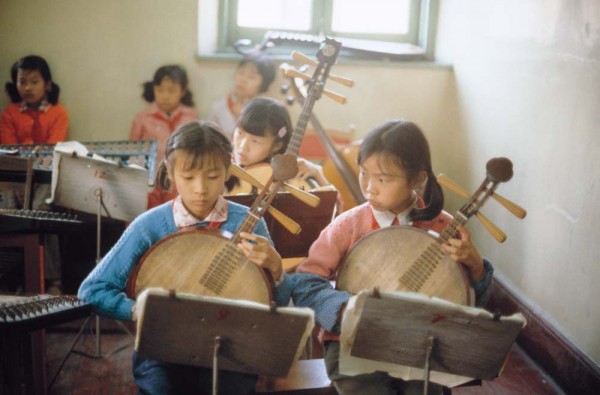
Children in a classroom wear brightly colored sweaters, a sign of new socioeconomic forces at play. (Photograph by Steve Stone ’83)
Richard Nixon had made his historic visit back in 1972, but it was a trend toward people’s diplomacy — nongovernmental exchanges such as those by Fetter and his students — that did much of the real work of normalizing relations between the U.S. and China through the 1970s and into the ’80s.
Marks’ parents initially objected to his going to China. Up to that point, “my academic performance was not stellar,” Marks said. A long trip to China looked like a boondoggle.
But Fetter had faith in Marks even though there was little obvious reason for it (which is the whole point of faith, anyway). He called Marks’ parents, promising that the experience would change the course of their son’s life.
It did. “Everything was different and amazing,” Marks recalled. During five weeks in Beijing and other cities, “I became hooked on China. I wanted to understand this chaotic, totally different world.” Marks had grown up in New York City, where the music of the city was honking horns and emergency sirens. Beijing was a “city of bicycle bells — not the Beijing of today.”

In cities and villages in 1981, bicycles were still the dominant mode of transportation. Beijing was “a city of bicycle bells,” Marks recalls, “not the Beijing of today.” (Photograph by Steve Stone ’83)
Marks returned to Bates eager to learn Chinese, but Bates didn’t have a Chinese language program. What the college had, as noted in the 1981 Catalog, was a “Self-Instructional Program in Less Commonly Taught Languages.”
In practice, the “program” was a black book in French professor and foreign-language chair Dick Williamson’s office, which he would flip through to find someone able or willing to teach a language not offered in the curriculum of French, German, Russian and Spanish.
Marks’ first instructor was the wife of a Taiwanese dentist in town. She tried to teach him Mandarin, “and I tried to teach her how to teach.” Marks was soon joined by CJ May ’80 as the college’s first students of Mandarin.
For Marks, the late Williamson’s help, along with Fetter’s and history professor Ernest Muller’s, represented the college’s can-do spirit. It’s also “typical,” Marks says. “Professors go beyond the call of duty to find opportun-ities for their students to engage, explore and find themselves.”
Today, Marks says he’s encouraged by strides in Chinese instruction and Asian-focused academic programs and opportunities at Bates. “You can be quite proud — I am quite proud — to see where the college’s journey has arrived.”
Back in 1981, the Bates group’s official guide, Mr. Xu, told Marks that foreigners never learn their language. Marks rose to the challenge, betting the guide five bucks that he could indeed learn Mandarin.
“Mr. Xu owes me five bucks. Or 31.7 RMB.”
